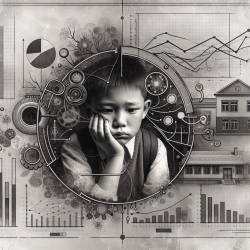Introduction
The phenomenon of children being left behind by migrating parents is a significant social issue, particularly in countries experiencing rapid urbanization, such as China. The research article "The Impact of Childhood Left-Behind Experience on the Mental Health of Late Adolescents: Evidence from Chinese College Freshmen" provides a comprehensive analysis of the long-term effects of such experiences on mental health. This blog aims to translate these findings into actionable insights for practitioners in the field of speech-language pathology and beyond, focusing on improving outcomes for affected children.
Understanding the Research
The study utilized data from 15,804 first-year college students in Jiangsu, China, collected between 2014 and 2017. It employed robust statistical methods, including the Propensity Score Matching (PSM) method and Ordinary Least Squares (OLS) regression, to control for confounding variables such as gender, age, and economic status. The results indicated that the experience of being left behind significantly worsened mental health, increasing measures of mental ill-being by 0.661 standard deviations (p < 0.01).
Key Findings
- Left-behind experiences have a significant negative impact on mental health, particularly increasing anxiety, depression, and stress among late adolescents.
- The adverse effects are more pronounced in females, single-child students, and urban residents.
- The study highlights the importance of parental presence during childhood for mental well-being.
Implications for Practitioners
For speech-language pathologists and other practitioners, these findings underscore the importance of considering family dynamics and parental presence when assessing and treating children and adolescents. Here are some practical steps to integrate these insights into practice:
- Holistic Assessment: Incorporate questions about family structure and parental presence in initial assessments to identify potential risk factors for mental health issues.
- Intervention Strategies: Develop intervention strategies that include family counseling and parental involvement, even if virtually, to mitigate the negative effects of being left behind.
- Collaboration: Work closely with educators and mental health professionals to create a supportive environment that addresses the emotional and psychological needs of left-behind children.
Encouraging Further Research
While this study provides valuable insights, it also opens avenues for further research. Practitioners are encouraged to explore the following areas:
- Longitudinal studies to assess the long-term impacts of left-behind experiences on mental health and academic performance.
- Comparative studies across different cultural contexts to understand the universality of these findings.
- Intervention studies to evaluate the effectiveness of different therapeutic approaches in mitigating the negative effects of being left behind.
To read the original research paper, please follow this link: The Impact of Childhood Left-Behind Experience on the Mental Health of Late Adolescents: Evidence from Chinese College Freshmen.










